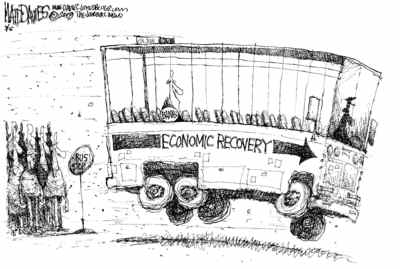- MENU
- HOME
- SEARCH
- VIDEOS
- WORLD
- MAIN
- AFRICA
- ASIA
- BALKANS
- EUROPE
- LATIN AMERICA
- MIDDLE EAST
- United Kingdom
- United States
- Argentina
- Australia
- Austria
- Benelux
- Brazil
- Canada
- China
- France
- Germany
- Greece
- Hungary
- India
- Indonesia
- Ireland
- Israel
- Italy
- Japan
- Korea
- Mexico
- New Zealand
- Pakistan
- Philippines
- Poland
- Russia
- South Africa
- Spain
- Taiwan
- Turkey
- USA
- BUSINESS
- WEALTH
- STOCKS
- TECH
- HEALTH
- LIFESTYLE
- ENTERTAINMENT
- SPORTS
- RSS
- iHaveNet.com: Economy
by Arianna Huffington

Listening to President Obama's heartfelt, well-intentioned, but ultimately naive speech Monday on financial reform, my mind kept flashing on a story I heard the last time Washington, in the wake of the
The story came from a friend who took a family trip on a cruise ship. Her 10-year-old son kept pestering the crew, begging for a chance to drive the massive ocean liner. The captain finally invited the family up to the bridge, whereupon the boy grabbed hold of the wheel and began vigorously turning it. My friend panicked -- until the captain leaned over and told her not to worry, that the ship was on autopilot, and that her son's maneuvers would have no effect.
And that's the way it is with our leaders. They stand on the bridge making theatrical gestures they claim will steer us in a new direction while, down in the control room, the autopilot, programmed by politicians in the pocket of special interests, continues to guide the ship of state along its predetermined course.
Standing on the deck at historic Federal Hall, the president said all the right things, eloquently pointing out how American taxpayers had "shouldered the burden of the bailout" and are "still bearing the burden of the fallout -- in lost jobs, lost homes and lost opportunities."
And I don't dispute for a minute that his heart is in the right place, and that he means it when he says "the old ways that led to this crisis cannot stand" and touts "the need for change and change now."
But we've been hearing similarly great sentiments for months now -- and they've had the same impact as my friend's 10-year-old yanking on the cruise ship wheel. None. President Obama won't be able to change the course our financial system is on unless he goes down into the boiler room and disengages the autopilot -- which means taking on the bankers and their hordes of lobbyists who continue to dictate policy in D.C.
To do that, the president will have to do more than deliver great speeches. He'll need to stand firm when the lobbyists, working behind the scenes, work to gut real reform, leaving only the appearance of reform in its place.
This is exactly what he failed to do when the banking lobbying killed cramdown legislation back in April that would have imposed mortgage reorganization plans over lender objections.
But instead of telling the Wall Street power players watching him Monday that he was going to insist on making cramdown a part of his financial reform package, he tried to appeal to their better angels, reminding them that they didn't have to wait for Congress to pass new laws &ellips; they could just start acting better on their own.
It was shockingly naive. Wall Street has been spending hundreds of millions of dollars, doing everything in its power to kill things like cramdown legislation, derivatives regulation, and the proposed
There was a moment in the speech that spoke volumes about the high hurdle financial reform is facing.
The
But when the president actually delivered the line, he edited it, saying instead that Wall Street should "embrace serious reform, not resist it."
That one-word change says everything you need to know about why all the president's well-intentioned pronouncements won't actually lead to fundamental reform. The president is utterly misreading the opponents of reform. They are not passively resisting; they are aggressively fighting against reform with every weapon they have in their extremely well-funded arsenal.
As a result, Obama's rhetoric has not been matched by reality. In his speech, the president claimed that the actions of his administration have "spurred lending" and "helped responsible homeowners refinance to stem the tide of lost homes and lost home values."
But, in truth, credit for Main Street is still very hard to come by, and only 12 percent of eligible homeowners have had their mortgages modified by the president's home ownership plan. Meanwhile cramdown legislation remains lobbyist roadkill (though Barney Frank is vowing to revive it this fall) and mandatory mediation between homeowners and lenders prior to foreclosure is going nowhere on a national level.
That's why I could picture all the heads of the big banks sitting there Monday, listening to Obama and smiling -- knowing that, in the end, his claim that his administration is "proposing the most ambitious overhaul of the financial system since the Great Depression" won't mean anything as long as Wall Street's relentless lobbying and contributing continue to hold sway in the control room of the S.S. America.
WORLD | AFRICA | ASIA | EUROPE | LATIN AMERICA | MIDDLE EAST | UNITED STATES | ECONOMY | EDUCATION | ENVIRONMENT | FOREIGN POLICY | POLITICS
Economy: Why Obama Won't Be Able to Reform Wall Street